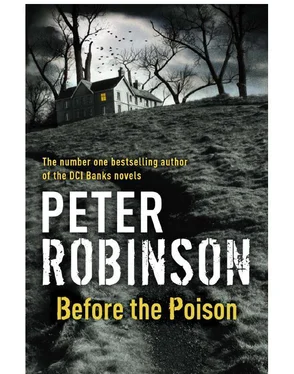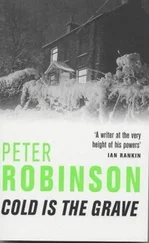Peter Robinson - Before the poison
Здесь есть возможность читать онлайн «Peter Robinson - Before the poison» весь текст электронной книги совершенно бесплатно (целиком полную версию без сокращений). В некоторых случаях можно слушать аудио, скачать через торрент в формате fb2 и присутствует краткое содержание. Жанр: Исторический детектив, на английском языке. Описание произведения, (предисловие) а так же отзывы посетителей доступны на портале библиотеки ЛибКат.
- Название:Before the poison
- Автор:
- Жанр:
- Год:неизвестен
- ISBN:нет данных
- Рейтинг книги:4 / 5. Голосов: 1
-
Избранное:Добавить в избранное
- Отзывы:
-
Ваша оценка:
- 80
- 1
- 2
- 3
- 4
- 5
Before the poison: краткое содержание, описание и аннотация
Предлагаем к чтению аннотацию, описание, краткое содержание или предисловие (зависит от того, что написал сам автор книги «Before the poison»). Если вы не нашли необходимую информацию о книге — напишите в комментариях, мы постараемся отыскать её.
Before the poison — читать онлайн бесплатно полную книгу (весь текст) целиком
Ниже представлен текст книги, разбитый по страницам. Система сохранения места последней прочитанной страницы, позволяет с удобством читать онлайн бесплатно книгу «Before the poison», без необходимости каждый раз заново искать на чём Вы остановились. Поставьте закладку, и сможете в любой момент перейти на страницу, на которой закончили чтение.
Интервал:
Закладка:
I smiled. ‘Touche.’
She sipped some tea, then smiled back. Her pale pink lipstick left a mark on the cup. ‘Do you believe in ghosts?’
‘I don’t know,’ I said. ‘I haven’t seen one yet.’
‘But you’ve only just arrived. You haven’t spent a night here.’
‘I don’t see why people should see ghosts only at night, do you? Anyway, I was just wondering, that’s all. It’s no big deal. I’m not scared or anything. It’s just that in America you hear about these queer things happening in England. Mary Queen of Scots slept here, headless bodies, haunted houses and all that. It comes with the territory. People think it’s quaint. Like the King’s Head.’
‘Yes, well, I have always thought Americans are rather gullible as regards some of the more fanciful flights of British history,’ Heather Barlow said, with a dry laugh to take the edge off the criticism. ‘I shouldn’t worry about ghosts if I were you. They don’t come with this territory. At least, nobody has ever reported seeing a ghost in this house, night or day. All old houses have their peculiar histories, of course, their terrible memories and their darker moments, perhaps, but they don’t necessarily manifest themselves as ghosts. And this may also be one of the few houses in the county where Mary Queen of Scots most certainly did not sleep. Now I really must go. My husband will be wondering where his dinner is.’ She finished her tea and stood up. Was there an angry edge to her words? Was she mentioning her husband for my sake? Did she think I was flirting with her?
I followed her towards the front door, took her coat from the cloakroom and helped her into it. She dug in her pocket for her car keys. When she found them, she turned to me with a new smile fixed in place and held out a square of cardboard. ‘You’ll need this if you drive into town. It’s a parking disc. Just set it for the time you arrive and display it on the dashboard. You’ve got two hours.’
I took the disc. ‘Thank you,’ I said. ‘Thanks for coming by, and thanks for everything you brought. Especially the champagne.’
‘You’re most welcome,’ she said, ‘though if you drink it all yourself, the next time you see me you may be more grateful for the coffee and paracetamol. Goodnight.’ And with that she dashed off, leaving me to stare at the closed door for a few moments, until the sound of her car starting shook me out of it. Then I shrugged and went back into the kitchen. I was impressed with Heather Barlow. She had gone out of her way to welcome me to Kilnsgate.
‘Well, Laura, my love,’ I said as I picked up my teacup and held it in the air in an imaginary toast. ‘Here we are. Home at last.’
2
Famous Trials: Grace Elizabeth Fox, April 1953, by Sir Charles Hamilton Morley In his 1946 essay
‘The Decline of the English Murder,’ Mr. George Orwell noted several common elements of the type of murder that provides the greatest amount of entertainment and satisfaction for the English public. In particular, he identified domestic life, sexual passion, paltry amounts of money, and the fear of scandal. While the murder of Ernest Fox does contain a number of these elements, it performs a subtle alchemy on them and presents us with something far more complex and substantial. Nothing about the Fox affair was what it seemed. Ostensibly a reserved, educated and considerate wife and mother, Grace Fox was, in fact, in the throes of a passionate adulterous liaison with a man – nay, a boy – young enough to be her own son. On the surface a devoted wife, she did, according to the evidence presented against her at her trial, poison her husband not only once, but twice. What kind of woman could do such a thing? Well may you ask. We must, however, put ourselves in the jury’s place and ask ourselves, on the basis of the witness testimony and evidence presented, whether indeed Grace Fox was the monster depicted by the prosecution, or was she, in fact, a decent woman driven to an extreme act of evil by a cold, cruel and uncaring husband, and by the unexpected passion and hope unleashed in her by her young lover Mr. Samuel Porter? Our interest in a crime lies not so much in what is abnormal about it, but in those elements we may share with the criminal. Can any one among us, especially those members of the fairer sex, say that Grace Fox was so different from the rest, that she was set apart by anything other than her desperation, her impulses and her poor judgement? Most murders may well be sordid and commonplace affairs, but once in a while a murder grips the imagination of the public owing to the characters of those involved and their heightened circumstances in life and within the communities they inhabit. This is just such a murder. While the details may well be vulgar, even gruesome, the ordinary human tragedy they reveal is what truly grips the audience. It is not that Grace Fox used some hitherto unknown or exotic manner of dispatch; she did not; she used poison. It is not that she showed unusual cunning or intelligence in her planning; on the contrary, she was quite easily apprehended. It is not even that she demonstrated anything unique as regards motive. The age-old love triangle lay at the heart of it all. But as Grace Fox sat in court day after day, silent and unmoving as the witnesses for the prosecution were paraded before her, never flinching as the cruellest and most intimate details of her thoughts and feelings were laid bare in the cold light of the courtroom, we felt that we were in the presence of a great enigma. For there she sat, beautiful in the simplest of clothes, the dark waves of her hair tied back from her pale, expressionless face. Was this, we wondered, the face of a cold-blooded killer?
October 2010
My grief is a sharp blade. It pricks me when I least expect it, digs deep into me, stabs and twists, on and on like a cat worrying a bird. I might be shopping in a supermarket or eating a meal in a restaurant, and my eyes begin to burn with tears, my chest constricts. Once or twice, concerned shop assistants have worried that I was having a heart attack and offered to call an ambulance. Perhaps, in a way, I was.
That first night at Kilnsgate House, it was a dream of Laura that woke me. At least I think it was. Not a recurring dream; I don’t have those. And it wasn’t a nightmare, either, except that the emotions associated with its simple images shook me the way nightmares do.
Laura was laughing over a board game with her brother Clayton – Monopoly, I think – while I was in the next room with the door open, sorting through my things. I had to leave for ever that day and would never see Laura again, though I had no idea why, or even whose idea it was, and I didn’t know what to take with me and what to leave behind. Their unfeeling laughter penetrated me to the core. I was staring at an old black and white photograph of me and a school friend whose name I couldn’t remember. In the photo, I was sitting proudly on my brand-new sledge, and he was standing by me. We both wore mitts and woolly hats with pompoms. I remembered that my father had made that sledge for me, remembered trudging around the scrap-metal yards with him searching for the runners. It had gone like the clappers until I ran it into a tree one day and was lucky to escape with a broken arm. The sledge wasn’t so lucky. Perhaps it was all a bit Citizen Kane, but there I was in the dream looking at this old photograph, crying my eyes out, my life in tatters for no reason I could understand, while my wife and her brother were laughing in the other room over who was buying Madison Avenue. I awoke with a sense of guilt and panic that soon turned into deep sadness and vague anxiety. The digital clock said it was 4.24.
Insomnia was hardly a novelty for me since Laura’s death, especially with the added confusion of my new surroundings, the wind howling outside, the rain lashing against the windowpanes, the water dripping from a broken gutter on to a hollow, echoing surface. The house itself, like Caliban’s island, was full of noises. Creaks in the old wood. An eerie whistling sound. A window rattling in its frame. A groan. A sigh. What sounded like anxious footsteps pacing up and down the corridor outside my bedroom. Lying there, unable to sleep, I began to feel quite scared, the way you do at 4.24 a.m. in an eerie old house, imagining all kinds of terrible creatures of darkness on the prowl. I could hear the soundtrack in my mind, a low-budget horror movie I had scored in my early days, all edgy strings, shrieking brass and staccato percussion. I remembered Heather Barlow and our talk of ghosts.
Читать дальшеИнтервал:
Закладка:
Похожие книги на «Before the poison»
Представляем Вашему вниманию похожие книги на «Before the poison» списком для выбора. Мы отобрали схожую по названию и смыслу литературу в надежде предоставить читателям больше вариантов отыскать новые, интересные, ещё непрочитанные произведения.
Обсуждение, отзывы о книге «Before the poison» и просто собственные мнения читателей. Оставьте ваши комментарии, напишите, что Вы думаете о произведении, его смысле или главных героях. Укажите что конкретно понравилось, а что нет, и почему Вы так считаете.












